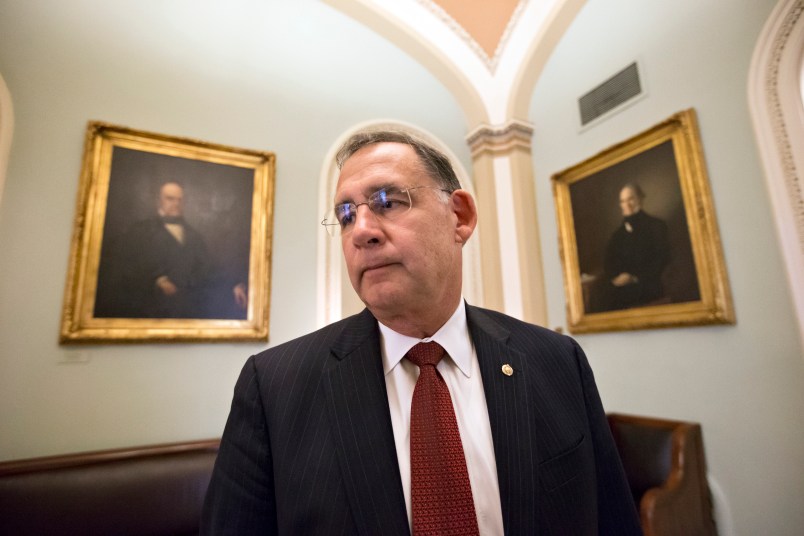Today two of our reporters were up on Capitol Hill looking for answers to what was afoot on the Medicare Phaseout and Obamacare fronts. I was particularly interested in the former. And Tierney Sneed was able to get some very key information from Sen. John Boozman (R) of Arkansas.
Boozman was already on our list of Medicare wobblers based on his office’s responses to constituents. But Arkansas is also one of the poorest state’s in the country. By various metrics, it’s a state particularly reliant on programs like Medicare. So where does Boozman stand?
Boozman was first asked ‘Are you supportive of efforts to do a major change to the Medicare system?’
Boozman: “It depends on the plan. certainly, I think it’s fine to look in the sense, we have to do something to control costs. Because we don’t have a plan and I am very much committed to doing all we can to protect and preserve Medicare … I’m open to looking at protect and preserving, the question is how do you do that.”
Next question: ‘Would you be comfortable with premium support?’
(This is a reference to the Ryan Phaseout plan, ‘premium support’ being vouchers to partially defray the cost of private insurance for seniors.)
Boozman: “Those are all things that … there’s going to be a lot of discussion. But in order to do something like that, in order to do a change, you’re going to need presidential leadership. You’re going to need the House and Senate working together, Democrats and Republicans. And then most importantly you’re going to need people of America to buy into it. If we can come up with something like that, I’m supportive. But that’s a lot of work.”
This is key.
Let me translate: Everyone’s up in the plane in their parachutes. Someone asks Boozman: ‘Are you ready to jump?’ He says, ‘Well, if the president goes first, and then if I see Republicans AND Democrats jump and then if the American people decide they want to jump too … well, then I’ll be right behind you.”
More seriously, this gives you a map into the essentials of this debate and how Medicare will survive if it does. Many Republicans can see the political danger of touching Medicare. No one campaigned on this in 2016. Support for phasing out Medicare and replacing it with private insurance and vouchers is minimal outside libertarians and conservative ideologues. That’s why word play about ‘reform’ and averting ‘bankruptcy’ and ‘saving Medicare’ are the catch phrases. If anyone said, ‘We have an idea to have seniors get private insurance instead of Medicare and a check from the government to pay part of the cost’ they’d be laughed out of whatever room they were in. What’s most salient is that it is toxic within the coalition around which Donald Trump has at least temporarily remade the GOP.
Paul Ryan and his backers in the Koch donor network want to do this badly. People like Mike Pence and Tom Price and a lot of hardcore conservatives in the House GOP caucus want to do this badly. It’s an historic culmination of decades policy dreams and preparation. But I doubt very much Trump and Ryan will be able to achieve this if they have to do it with no Democratic votes.
This is what short-circuited President Bush’s attempt to partially phase out Social Security in 2005. Republicans were willing but wary. They wanted President Bush to bring along some number of Democrats and move public opinion in his favor. As Democrats coalesced around an all but unanimous refusal to support or even negotiate over any phaseout plan, the effort collapsed. The key was depriving would-be privatizers of the cover of ‘bipartisanship’ and anonymity in the legislative crowd.
The Senate will be the hardest obstacle for the Trump/Ryan phaseout supporters. But deprived of any Democratic support, I think they’ll have challenges in the House too. Of course, there they have a number of votes to spare there.
But again, this is why it is vital both in civic and political terms to find out where everyone stands. Many members of Congress are going to be happy to do this as long as there’s safety in numbers, as long as they know they’ll be protected, as long as they’ll just be one more anonymous vote. If they’re deprived of bipartisan cover, many Republicans will refuse to go along. If constituents force them to say where they stand, many will buckle. They will do everything they can to keep their position hidden or impossible to determine until it’s clear which way the political winds are blowing.






